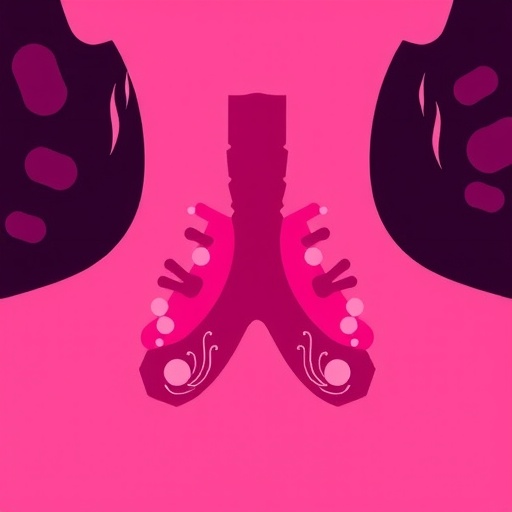In a groundbreaking investigation published in BMC Cancer, researchers have unveiled intricate connections between gut microbiota and thyroid cancer, highlighting significant sex-associated distinctions that could revolutionize early detection and personalized treatment strategies. This pivotal study, encompassing a cohort of 268 individuals, delves deep into the microbial ecosystems residing within the human gut, exposing microbial biomarkers that may serve as harbingers of thyroid malignancies.
Thyroid cancer (TC), a growing global health burden, presents diagnostic challenges that often delay timely intervention. Scientists have long speculated that the gut microbiome, a complex community of trillions of microorganisms, influences carcinogenesis beyond the confines of the gastrointestinal tract. The study meticulously compared gut microbiota compositions between thyroid cancer patients — stratified by sex — and healthy controls to elucidate these dynamic microbial landscapes.
The cohort was comprised of 60 female and 26 male TC patients, alongside 182 healthy individuals carefully matched for age and sex. Such rigorous matching ensured that observed microbial variations stemmed from disease status rather than demographic disparities. Employing high-throughput sequencing alongside robust bioinformatics analyses, the scientists probed alpha and beta microbial diversities, uncovering significant discrepancies correlating with thyroid cancer presence.
Alpha diversity metrics, reflecting within-sample microbial richness and evenness, were markedly altered in patients relative to healthy controls, signifying a dysbiotic gut milieu in thyroid malignancy. Beta diversity assessments further revealed distinct microbial community structures segregating cancer-afflicted individuals from their healthy counterparts. These observations underscore the potential of gut microbiota as non-invasive biomarkers heralding the onset of thyroid cancer.
Intriguingly, sex-specific analyses unearthed nuanced microbial profiles, accentuating the interplay between biological sex and gut ecosystems. Both male and female TC patients exhibited dominance of Blautia and Alistipes species, suggesting shared microbial signatures associated with thyroid tumorigenesis. However, overlap accounted for only 25% of dominant bacteria, illuminating drastic divergence in microbial contributors across sexes.
Female patients demonstrated unique enrichment of Schaalia, Moraxella, and Alicyclobacillus, bacteria often implicated in modulating inflammatory and immune pathways. These microbes may interact with estrogen signaling or other female-specific biochemical milieus, potentially accelerating carcinogenic processes. Conversely, male patients harbored elevated levels of Holdemanella, Clostridium_sensu_stricto, and Senegalimassilia, taxa linked to metabolic alterations and immune modulation in men, hinting at divergent oncogenic mechanisms shaped by hormonal and metabolic contexts.
One standout microbial genus, Catenibacterium, emerged as a dominant distinguishing feature irrespective of sex. This bacterium exhibited remarkable predictive accuracy, with an area under the receiver operating characteristic curve (AUC) of 0.911 when differentiating TC patients from healthy controls. When combined with Aquabacterium and Dialister, predictive power surged to near-perfect (AUC = 0.992), proposing an innovative microbial panel for non-invasive thyroid cancer screening.
These remarkable findings implicate gut microbiota not only as diagnostic vectors but also as possible contributors to thyroid cancer susceptibility, progression, and sex-based disparity. The differential microbial signatures likely reflect complex hormonal regulation, immune system interplay, and metabolic differences inherent to males and females. This tripartite interaction may influence tumor microenvironments, shaping disease trajectories and therapeutic response.
Delving deeper into mechanistic implications, alterations in Blautia and Alistipes abundance could modulate short-chain fatty acid production, thereby influencing systemic inflammation and immune surveillance relevant to thyroid oncogenesis. Simultaneously, the sex-specific bacteria might interact with sex hormones, such as estrogens and androgens, which are known to impact thyroid physiology and immune regulation, further intertwining endocrine and microbial factors in cancer development.
The striking sex differences in gut microbiota profiles of thyroid cancer patients call for integrative research combining microbiology, endocrinology, and oncology. Future investigations employing metagenomic and metabolomic approaches could elucidate the functional roles of these bacterial taxa, deciphering how microbial metabolites or immune-modulatory molecules contribute to thyroid tumorigenesis in a sex-dependent manner.
Clinically, the advancement of microbial biomarker-based diagnostics holds promise for non-invasive, precision oncology. Early detection facilitated by fecal microbial profiling could transform thyroid cancer management by enabling preemptive interventions and tailored therapies based on patient sex and microbiome composition. Moreover, therapeutic modulation of gut flora through probiotics, prebiotics, or microbiota transplantation may emerge as adjunct strategies to conventional treatments.
Nevertheless, these findings necessitate validation in larger, multi-center cohorts with longitudinal follow-up to capture temporal microbiome dynamics throughout disease progression and treatment. Additionally, dissecting host-microbe interactions at cellular and molecular levels will be vital for translating microbial signatures into mechanistically informed clinical tools.
In conclusion, this comprehensive exploration into the gut microbiome unveils a new frontier in understanding thyroid cancer pathophysiology, emphasizing sex-specific microbial architectures that could redefine diagnostic and therapeutic paradigms. The novel identification of robust microbial biomarkers paves the way for precision medicine approaches while highlighting the intricate biological crosstalk governing cancer susceptibility.
As the scientific community advances toward integrating microbiome science with clinical oncology, such groundbreaking studies set the stage for harnessing the gut microbiota’s untapped potential in combating thyroid cancer, ultimately enhancing patient outcomes through personalized, microbiota-informed strategies.
Subject of Research: Microbial biomarkers and sex-associated gut microbiota characteristics in thyroid cancer
Article Title: Microbial biomarkers and sex-associated gut microbiota characteristics of thyroid cancer
Article References:
Gou, J., Hu, Z., Cai, M. et al. Microbial biomarkers and sex-associated gut microbiota characteristics of thyroid cancer. BMC Cancer 25, 1688 (2025). https://doi.org/10.1186/s12885-025-14986-0
Image Credits: Scienmag.com
DOI: 10.1186/s12885-025-14986-0 (03 November 2025)




